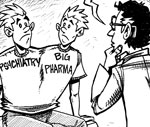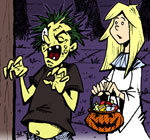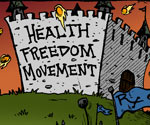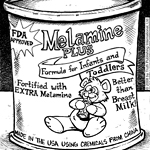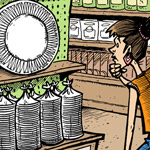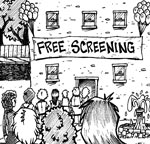Serotonin is Not Just a Mood Chemical
| Share on Facebook | Share on Twitter | Share on Google+ |
With almost religious devotion, five year-old Timmy carefully avoids stepping on any crack on a sidewall, ever since he learned the phrase "Step on a crack and break your mother's back."
Every winter Joan gains two to five pounds (1-2 kilos). She begins having intense sugar cravings in November that last until the middle February.
Despite being raised by loving parents in a middle-class home, Aden was never a happy child. In elementary school he developed uncontrollable tics and then full-fledged Tourette's syndrome. The teasing by his classmates was relentless. In middle school he began having problems with alcohol, marijuana, and inhalants, and at the age of 16 he was arrested for armed robbery.
Kathy has a new pain every day. She can't sleep, she can't focus, and all she wants to do is eat. Her doctor tells her that her problems are all in her head.
And possibly they are. All four of these unfortunate individuals have conditions related to imbalances in serotonin, and all four can benefit from rebalancing the production of serotonin. Regulating serotonin production is not always a matter of finding the right medication.
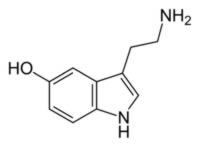 What is serotonin? Serotonin is a neurotransmitter. It helps neurons transmit messages to each other, both inside the brain, and elsewhere in the body.
What is serotonin? Serotonin is a neurotransmitter. It helps neurons transmit messages to each other, both inside the brain, and elsewhere in the body.
Serotonin is important in the brain as a regulator of the "speed of processing" in ways that affect mood, but most of the body's serotonin is found outside the brain. About 80 per cent of the serotonin is in the digestive tract, where it regulates stomach and bowel movements. The rest of the body's serotonin is in the brain and blood platelets. The platelets store serotonin until they need to make a clot. During the process of clot formation, the platelets release serotonin for use as a vasoconstrictor, effectively shrinking the blood vessel so it is easier to stop bleeding.
Excess serotonin is recycled by the liver with the help of an enzyme called a monoamine oxidase. One kind of cancerous tumor, known as a carcinoid, produces its own serotonin and releases it into the bloodstream. The excess serotonin causes diarrhea, facial flushing, and high blood pressure.
What does serotonin do in the brain? Serotonin is usually called a "mood chemical," but it is important to many more functions in the brain than just regulation of emotional state.
Serotonin inhibits appetite. Receptors in a part of the brain known as the hippocampus are sensitive to serotonin at night, when appetite would interfere with sleep, but insensitive to serotonin at normal meal times.
Serotonin fuels the centers of the brain that assess social status. The effect is more obvious in animals than in humans. When a lobster is injected with serotonin, for example, it will begin to claw at other lobsters as the "boss." Humans who have low serotonin levels tend to feel that they are trapped by their circumstances, while humans who suffer serotonin syndrome (too much serotonin) don't recognize appropriate boundaries.
A newly discovered activity of serotonin is the regulation of muscle tone, making muscles tighter or looser through the process of serotonylation, the release of serotonin to muscle fibers, bypassing the nervous system. Also, the digestive system uses serotonin as a signal to speed up bowel movement when toxins are detected in food.
Much of the venom expelled in a bee or wasp sting is serotonin. The pain caused by the sting is due to sudden constriction of blood vessels around the stinger, triggered by the injection of serotonin.
Serotonin reuptake and serotonin reuptake inhibitors. The amount of serotonin in the brain and in the rest of the body is kept constant by a process called serotonin reuptake. Serotonin only helps transmit nerve signals when it is present in the gaps between neurons. The neurons absorb and release serotonin to keep the transmission of nerve signals regular.
Certain substances can interfere with the reuptake of serotonin by neurons. These are known as serotonin reuptake inhibitors. Cocaine, amphetamines, ecstasy (MDMA), and dextromethophan (an ingredient in cough syrup) are all serotonin reuptake inhibitors. "Magic mushrooms," mescaline, and LSD are not serotonin reuptake inhibitors, but rather stimulants of additional serotonin production.
Managing serotonin to alter mental status. Three kinds of drugs are used to increase serotonin levels to reduce depression. These are:
- Monoamine oxidase inhibitors, also known as MAOIs,
- Tricyclic antidepressants, and
- Serotonin reuptake inhibitors.
Monoamine oxidase inhibitors keep the monoamine oxidase enzyme from breaking down serotonin. Nowadays they are mostly used to treat problems in the peripheral nerves, such as diabetic neuropathy in the feet and hands.
Tricyclic antidepressants prevent the reuptake of both serotonin and norepinephrine (also known as noradrenaline). Serotonin reuptake inhibitors keep serotonin in the gap between neurons, increasing brain activity, but they can also interfere with serotonin in the digestive tract. Selective serotonin reuptake inhibitors, or SSRIs, are intended to work only in the brain, not causing side effects due to changes in the 80% of the body's serotonin that is found outside the brain. A common problem with SSRIs is that they initially increase the amount of serotonin available to the brain, but, over time, they actually reduce it below initial levels. Typically, doctors just change prescriptions.
Managing serotonin naturally. Supplements such as 5-HTP and herbs such as St. John's wort are very popular for treating mild to moderate depression, and there is considerable evidence that, when taken in the right doses, they usually work. Where there can be problems is stopping a prescription antidepressant abruptly, or taking a prescription antidepressant and St. John's wort or 5-HTP at the same time.
Taking 5-HTP increases the production of serotonin in the brain, and this can be too much if there is also a medication decreasing reuptake of serotonin by the brain. The combination of a prescription antidepressant and St. John's wort can cause serotonin syndrome, which affects not just mood but also the bowels. Usually, it's a good idea to have been off any prescription antidepressants at least four, and preferably six, weeks before starting any natural supplements.
Fears, phobias, obsessions, compulsions, and uncontrollable behaviors all respond to natural therapies. The key is to realize that the most severe disorders require medical treatment-sometimes to save lives-and natural therapies are best used for maintenance or for mild symptoms. Never hesitate to tell your doctor about any natural products you may be taking or thinking about taking to get the best of both forms of treatment.
More Serotonin Related Articles
Serotonin and Schizophrenia - For decades research psychiatrists explained the biology of schizophrenia in terms of the neurotransmitter dopamine. Now researchers have found a link between another neurotransmitter, serotonin, and the most stereotypical symptom of schizophrenia, hallucinations.
Serotonin and Weight Loss - Depression is even more depressing when it comes with weight gain. The easiest way to lose the extra pounds put on while taking antidepressant medication, however, is the serotonin power diet.
Serotonin Blood Test - Do you need a serotonin blood test? Chances are that you don't, and here are the reasons why.
The Serotonin Power Diet - Medication-induced weight gain, especially for diabetics, is the side effect of prescription drugs doctors not only tell you about, they blame on you. The serotonin power diet, however, is the ideal plan for medication-induced obesity.
Trytophan and Serotonin - The amino acid tryptophan is the basic building block of serotonin. Simply taking a tryptophan supplement or getting more tryptophan in your diet, however, will not necessarily help your brain make the serotonin it needs to fight depression.
What is Serotonin Syndrome - Combining prescription medication for depression with over the counter nutritional supplements can sometimes result in a condition called serotonin syndrome. Here is an explanation of what it is, who is likely to have to deal with it, and how it can be prevented.
Tramadol - Tramadol is a reliable medication for pain, but it can be dangerous or even deadly combined with medications that decrease serotonin reuptake.
How to Increase Serotonin Levels Naturally - Tens of millions of people who suffer depression are prescribed serotonin reuptake inhibitors, medications that force the brain to increase serotonin levels. But one natural supplement offers a way to allow the brain to make the serotonin it wants when it wants it.
Serotonin and Depression - Chances are that you know serotonin is the brain's "mood chemical." But did you know that serotonin is the link between mood and food?
Serotonin and Dopamine - Serotonin and dopamine are well-known regulators of mood and behavior. Surprisingly, both chemicals can be found in some of the foods we eat in amounts large enough to affect the human brain.
Serotonin and Exercise - Dr. Andrea Dunn of the Cooper Institute in Dallas, Texas, says that exercise affects the brain the same way that antidepressant drugs do. Exercise, she says, may be a viable alternative to antidepressant drugs in people for whom they are not effective and for people who should not take them.
Serotonin and Melatonin - Serotonin is the well-known regulator of mood, that also regulates the speed of digestion. Melatonin is the well-known regulator of sleep, that also fights cancer. The relationship between serotonin and melatonin is explained here.
Serotonin and Migraines - Until very recently, all pharmaceutical treatments for migraine headaches involved increasing the brain's sensitivity to serotonin. Understanding how serotonin is involved in migraine helps migraine sufferers get better control over the disease.
Serotonin and Ocd - Deficiency in the production of the neurotransmitter serotonin may be a root cause of obsessive-compulsive disorder, also known as OCD. And replenishing serotonin may be part of the cure.
Serotonin and Sleep - One of the worst complications of depression is either needing to sleep all the time, or hardly ever getting to sleep at all. Both extremes are due to imbalances of serotonin and melatonin. Here is what you can do about them.
Serotonin Deficiency - Nutritional supplements are sometimes advertised as a remedy for "serotonin deficiency." But it isn't serotonin that is really deficient.
Serotonin Levels - Low serotonin levels don't necessarily cause depression, and raising serotonin levels does not necessarily cure it. It's important not only to get the basic building blocks of serotonin from the diet, but also to have the right serotonin levels in the brain by managing serotonin reuptake.
Serotonin Side Effects - Serotonin side effects can occur after eating too much of foods that contain natural serotonin, or after taking medications that stop nerves in the brain from reabsorbing serotonin. Here is what everyone on antidepressant medication needs to know about symptoms of too much serotonin.
Serotonin Syndrome Symptoms - Serotonin syndrome is a potentially deadly complication of suddenly increasing the dosage of certain antidepressant medications. But how can you know if you have it?
Serotonin Toxicity - Do you ever just go bananas - especially after you eat bananas? Are there certain foods that seem to zap your brain? For many people, there are, and the underlying problem is serotonin toxicity.
Serotonin Withdrawal Syndrome - Breaking up with Celexa, Luvox, Paxil, Prozac, or Zoloft can be hard to do. Here is what you need to know about selective serotonin reuptake inhibitor withdrawal syndrome and how it can be prevented.
Serotonin Foods - Some foods contain natural serotonin. Other foods contain the building blocks the brain needs to make serotonin. And still other foods interfere with absorption of the amino acids that become this important regulator of mood. Here is an article explaining the foods to emphasize, and the foods to avoid.
-
Skin CareMen Skin Care
-
Free ResourcesFree eBooks
-
When it comes to eating right and exercising, there is no "I'll start tomorrow." Tomorrow is disease.Terri Guillemets
-
Featured Health Supplement"...I also suffer from mild-to-moderate depression, so several months ago as an experiment I ordered a few bottles of the Neuro-Natural Serenity formula, but never took it consistently. However, I started taking it faithfully last week at full dose and already my spirits are lifting and I have a greater clarity of mind."
Cathi, USA -
